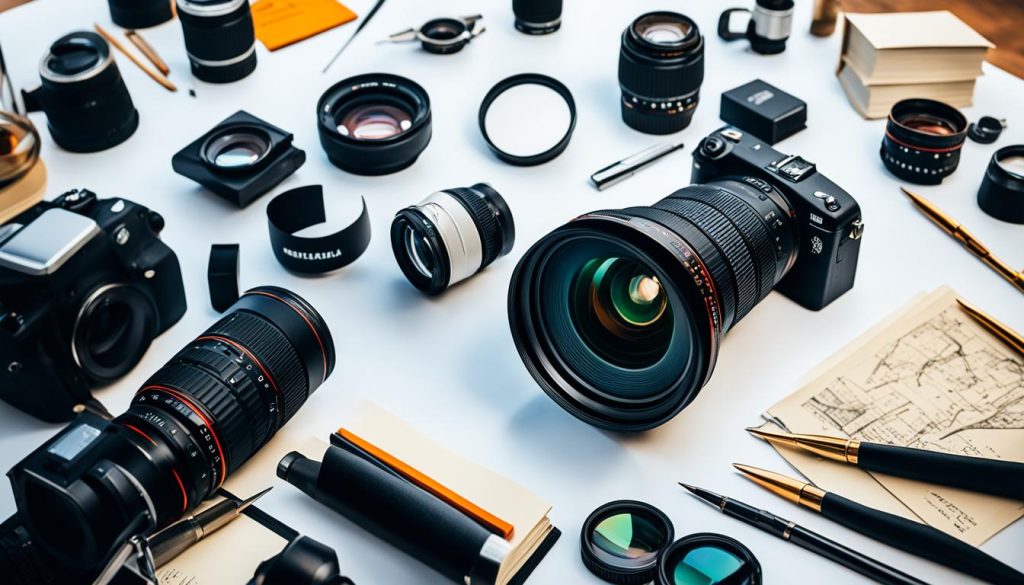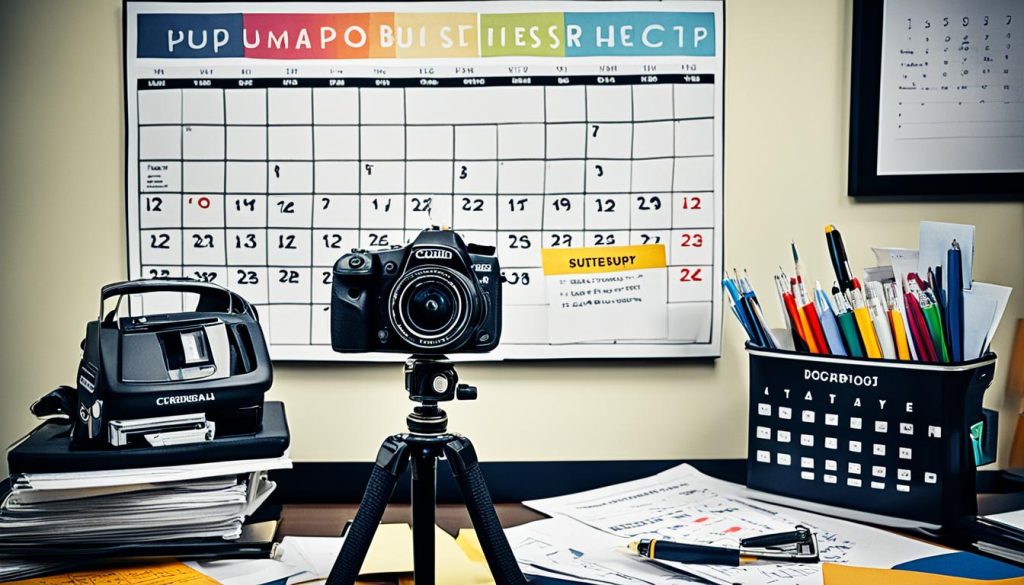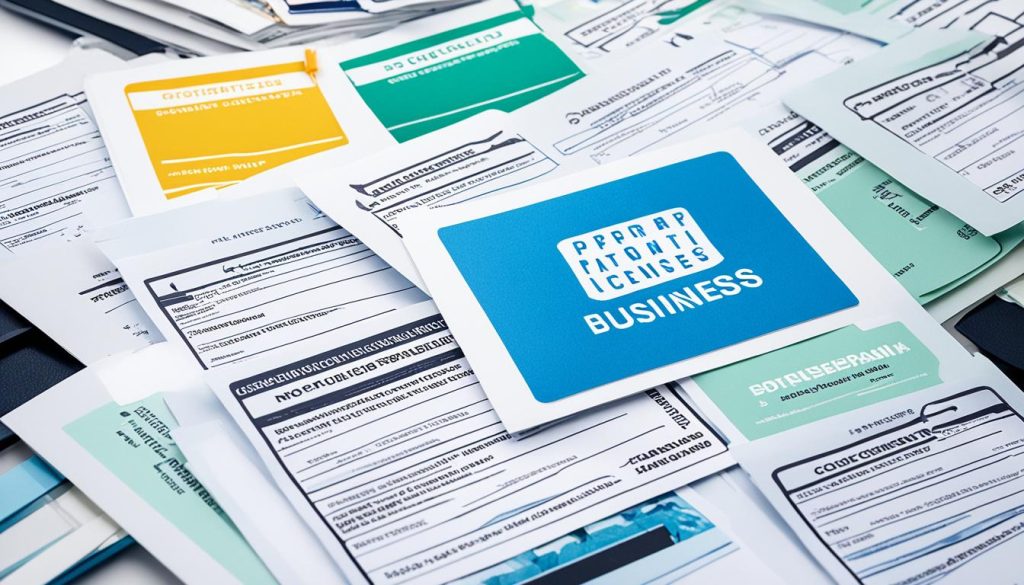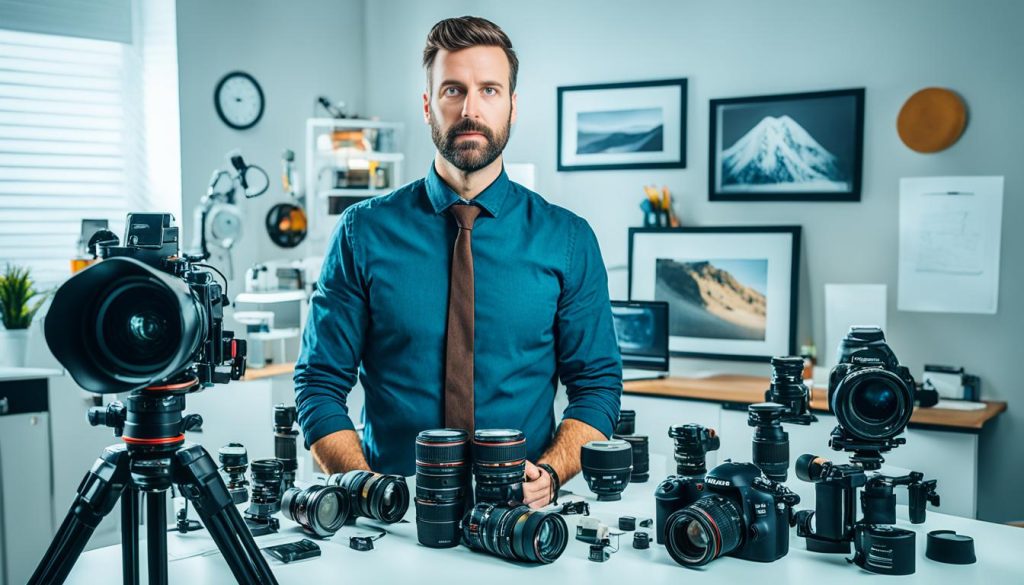Starting a successful photography business in the UK takes careful planning. You need to follow the steps in a detailed photography business setup. This includes creating a solid start photography business UK, photography business registration, and photography business planning plan. Your plan should talk about what your business will do, who it’s for, and how it will work. Also, it needs to show how your business will grow and make money.
- Write a Comprehensive Photography Business Plan
- Estimate the Startup Costs
- Consider Formal Photography Training
- Decide on Business Structure: Sole Trader or Limited Company
- Find Your Photography Niche
- Photography Business Setup
- Invest in Essential Photography Equipment
- Build an Online Portfolio and Website
- Develop a Marketing Strategy
- Network and Attract Clients
- Create Client Contracts and Pricing Plans
- Obtain Necessary Licenses and Permits
- Continuous Learning and Skills Development
- Manage Finances and Taxation
- Ensure Proper Insurance Coverage
- Consider Joining Professional Organisations
- Source Links
This plan isn’t just a document. It’s a map that guides your photography business. It shows what steps to take and what goals to aim for. And, it lets others like investors and clients see you have a serious and smart business.
Key Takeaways
- Drafting a comprehensive business plan is crucial for setting up a successful photography business in the UK.
- The business plan should cover key areas such as executive summary, market opportunity, business execution strategy, marketing plan, and financial projections.
- A well-crafted business plan helps establish the photography business as a professional and serious venture.
- The business plan sets out the strategy and objectives, and breaks them down into concrete tasks and clear goals for success.
- The business plan demonstrates the photography business’s viability to potential investors, loan advisors, and clients.
Write a Comprehensive Photography Business Plan
Creating a complete business plan is key for a successful photography business in the UK. It acts as a guide, showing your strategy and the steps to turn your dream into a reality. Detailing from top to bottom, it shows your business is solid to investors or for getting loans.
Executive Summary
The executive summary is a short overview of your photography business. It says who you are, what makes your services stand out, and why you’ll do well. Include a list of your main offerings to help readers understand your business.
Market Opportunity
This part talks about how your photography business can do well. It looks at the types of photography you’ll do and what people in your area need. You’ll also talk about your competition and how you plan to be different.
Business Execution Strategy
Your plan should also talk about how you will reach your goals. It lays out your big objectives and the detailed plans to hit them. This part aims to show your business is solid and ready for success.
Marketing Plan
Having a good marketing plan is key for growing your business. It outlines how to get new clients and keep them. Work on detailed profiles of your ideal customers to understand them better.
Financial Projections
Your financial plan is vital, including budgets and future forecasts. It also looks at what your business owns, owes, and its value. This helps others see the potential for your photography business.
Estimate the Startup Costs
Starting a photography business in the United Kingdom means thinking about the costs. There are many one-time and ongoing costs as per the first source. This includes buying the right equipment and other business needs.
One-Time Expenses
First, you’ll need to buy important camera gear like cameras, different lenses and flashes. Don’t forget memory cards or film, and drives for saving your work. You also need a good computer for editing and a website for your business.
This website might cost money to set up, or to buy a domain. Don’t overlook studio lights, flashes, and reflectors. They’re key to taking great photos.
Ongoing Expenses
Keeping your business going also has costs. You need things like business cards and material for advertising. Software for editing your photos, and licenses to use other images are necessary. It’s wise to have insurance for your business too.
There are also fees for keeping your business records straight and for professional learning. These costs keep the business growing. The first source suggests startup costs could be between £5,000 and £10,000. This depends on what you need. But, with a good plan, you can manage these costs and start your business well.
Consider Formal Photography Training

Many professional photographers have attended college or university to get better at their craft. There isn’t always a specific photography qualification needed for running your own business. But, a degree in fine arts is really useful for those wanting to pursue photography seriously.
It’s also good to keep learning. This helps stay updated with new techniques and software. Some courses on tools like Photoshop can be very beneficial.
For getting work, being detail-oriented and creative are key. You also need to be good with managing time and projects. These skills will help you build a portfolio that attracts clients.
Decide on Business Structure: Sole Trader or Limited Company
Starting a photography business in the UK involves choosing a legal structure. You can be a sole trader or set up a limited company. This decision affects how you manage your business legally.
Register as a Sole Trader
A sole trader runs their business alone. The owner and the business are not legally separate. So, any profits or losses belong to the trader.
To become a sole trader, you need a National Insurance number. You must also keep financial records and do a tax return each year. You can use your name or choose another name for your business without official registration.
Set Up a Limited Company
Choosing a limited company means your business and you are separate entities. The company’s name and logo must be legally registered to avoid brand violations. You must also get an employer identification number (EIN) for banking, taxes, and licenses.
Having a limited company offers more legal protection for you and your business. It’s seen as an entity on its own, shielding your personal assets in most cases.
Find Your Photography Niche
Finding a photography niche is vital for a successful business. The UK has many photography fields to choose from. You can work in areas like weddings or cover sports events.
Wedding Photography
Wedding photography dominates the industry, making up 38.1% of revenue. It’s always in demand but can be stressful. A great shoot can quickly spread by word of mouth.
Commercial Photography
Commercial photographers sell photos of products and promote businesses. This work can include fashion photos or online catalogues. It’s a high-paying job but not as creative because it focuses on selling.
Sports Photography
Professional sports matches often hire photographers. It’s all about capturing quick, key moments. Sports photographers must be fast to not miss a shot.
News Photography
News photographers work for papers or local TV. They cover local events and stories. The work can be irregular, affecting your income and schedule.
Portrait Photography
Portrait photography remains popular for special family moments. There’s steady work, but the photos mostly include families or pets. There’s little change in the photography types needed.
Photography Business Setup

Starting a photography business in the UK takes a few key steps to do it right from the beginning. You’ll learn how to register your business. And, you’ll see what licenses and permits you need. Plus, you’ll find out how to set up your finances and stay on top of the rules.
To begin, think about what kind of business you want. This could be as a sole trader or as a limited company. Make sure to pick the best one for your needs and future plans.
Next, make sure you’re all set with the right paperwork to work. This might mean getting a general business license. Or, specific permits for your photography type. You might also need special OKs to take photos in some places.
Getting your money matters organised is also key. Set up a business bank account. Get your invoicing and bookkeeping sorted. And, keep track of your taxes with good records and reports.
As you go, stay up to date on the rules and what the industry expects. Regularly check how you’re doing things. This is to keep your business running well and impressing your clients.
Invest in Essential Photography Equipment
A top-quality DSLR or mirrorless camera is key for photography businesses. Look for features like a full-frame sensor and reliable autofocus. According to a recent study, starting with a lower-budget camera can cost between £1,500 to £7,000.
Camera
Photographers need different lenses for various shots. For example, a wide-angle lens is great for landscapes. Fast prime lenses are ideal for low-light conditions and portraits.
A telephoto lens helps capture faraway subjects. Prices for lenses vary widely, from as little as £20 to as much as £16,500.
Lenses
A tripod is essential for a stable camera. It’s particularly useful for photos that need long exposures. The right tripod choice depends on your camera’s size and weight.
Tripod
For some photography styles, like studio or location shoots, extra lighting gear is necessary. This could include softboxes, umbrellas, or continuous lights. They offer more lighting control.
Lighting
To manage your photos, you’ll need high-capacity memory cards and back-up solutions. External hard drives and cloud storage are also crucial for keeping your files safe.
Storage and Backup
Specialised software, such as Adobe Photoshop and Lightroom, helps edit and organise your images. These are must-have tools for any photographer.
Photo Editing Software
Build an Online Portfolio and Website
Having a strong online presence is key for a photography business to get new clients. You can do this by making a portfolio website or using popular social media like Instagram and VSCO. This way, you show your best work and what services you offer.
Make your online portfolio show your special photo style and all your skills. Pick out your most striking images to show you’re good at various types of photography. Organise the portfolio so it looks good and is easy for visitors to use and see your talent.
Also, think about making a professional website for your photography business. This site should show your work and give details about your services and prices. You could also include a blog for sharing advice and connecting with people interested in your work.
Putting time and energy into your online presence is worth it. It helps build your brand and tells clients you’re a top, reliable photographer.
Develop a Marketing Strategy
Creating a solid marketing plan is key for any photography business to succeed. By focusing on social media, your brand’s look, and targeted ads, you can connect with more clients. This leads to the growth of your photography business.
Grow Social Media Presence
Being active on social media helps your photography business be seen by more people. You should post great photos, show what happens behind the scenes, and talk with those who follow you. This makes people more interested in your work.
Establish Brand Identity
Building a strong brand is crucial. Your logo, design, voice, and stories all play a part. They help your business look unique and memorable. A strong brand helps people recognise and remember your photography business.
Advertising Campaigns
Using Google Ads to target people looking for photographers locally can boost your website’s traffic. It also puts your work in front of more viewers. This means you can attract people who actively need photography services, turning them into clients.
Network and Attract Clients
It’s vital to build a strong client network for your photo business. Stay professional at all steps, from introducing your services to final image delivery. This approach often brings back old clients and attracts new ones through positive word-of-mouth.
Ask happy customers to leave good reviews online. These reviews are like gold for attracting fresh faces and proving your worth. With great service as your main goal, you will make fans out of clients. They will be the key to a successful future for your business.
Create Client Contracts and Pricing Plans
For a photography business, having clear client contracts and prices is key. This protects your finances and sets mutual expectations. It keeps your relationship with clients smooth.
Contracts should detail things like photo amounts, event coverage times, and extra services. Include info about photo rights, cancellations, and how you deal with problems.
When setting prices, think about time spent, equipment costs, and what others charge locally. Make sure your packages cover a wide budget range. Keep your prices clear and steady to avoid confusion. Also, explain your pricing to clients.
Having open and fair contracts and prices is important. It makes running your business easier and gains trust from your clients.
Obtain Necessary Licenses and Permits

Starting a photography business in the UK means you need the right papers. You must have the correct licences and permits to work legally. This depends on what types of photos you take and where you work.
You should first get a general business licence from your local council. This means registering your business and paying fees. If you will sell photos or photo products, you might need another licence for that.
Sometimes, you need special permission to take photos in certain places or events. This is common for public spaces, historic sites, or private parties like weddings. Check what rules apply to the areas you plan to work in.
Think about what type of photos you will take. If you work with children or people in need of protection, you may need extra checks. This is to make sure you are safe and trustworthy to work with them.
Having all the correct papers is important. It keeps you and your business out of trouble. It also shows your clients that you are a serious and reliable photographer.
Continuous Learning and Skills Development
In today’s fast-changing photography world, business owners need to keep learning. They must stay sharp and improve their skills. This way, they offer better and more varied photos.
Attending workshops and taking classes helps. So does learning new software like Adobe Photoshop. These tools make pictures look stunning. Also, trying new types of photography, like taking pictures from the sky, helps a lot. It brings in new customers and makes the business stand out.
A growth mindset and love for photography are key. They keep a business ahead and meet new market needs. Owners should always look to learn. This makes their brand stronger and puts them in a leadership position in the industry.
Manage Finances and Taxation
Keeping good financial records is key to a photography business’s success. Record-keeping, efficient invoicing, and careful tax filing are vital. This ensures the business follows the law.
Many photography entrepreneurs find it helpful to work with an accountant. These professionals can offer advice on setting up bookkeeping and improving tax plans. Or, they might invest in easy-to-use financial software. This software makes managing finances simpler and more accurate.
Understanding your tax duties in the UK if you run a photography business is crucial. This involves tasks like registering for self-assessment and handling payments. It also means making sure your tax returns are submitted on time. Keeping up with these duties avoids fines and maintains a healthy cash flow.
Ensure Proper Insurance Coverage

As a professional photographer, having the right insurance is vital for protecting your work and belongings. You should get insurance like liability and equipment insurance. These protect your business from harm, accidents, or legal troubles.
Liability insurance is key. It covers you if someone gets hurt or their stuff is damaged at one of your shoots. It saves you from a big financial hit from lawsuits.
Equipment insurance is just as necessary. It pays for repairing or replacing your gear like cameras and lights. So, you won’t be out of business if something happens to your equipment.
Choosing the best policies means finding a trusted insurance company. Look for one that knows about covering photography businesses. They can make sure your insurance suits your needs.
Consider Joining Professional Organisations
Being part of a top professional photography group can benefit your business. These groups let you meet other photographers and important figures. You also get access to useful learning materials, like workshops and publications, to keep improving your skills.
The Royal Photographic Society (RPS) stands out in the UK. Joining means you can take part in big awards plus show your work in top exhibitions. You could also earn titles that make your brand more trustworthy. The RPS offers a community where you can get advice, swap stories, and do projects together.
The British Institute of Professional Photography (BIPP) is another key group. It helps with networking and learning but also sets high standards for its members. By joining BIPP, people in the industry will see your business in a better light. This could make your photography services stand out as reliable and trustworthy.












